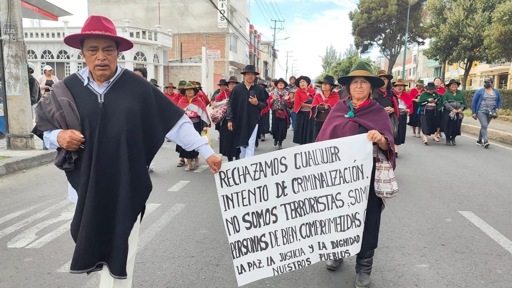A week since protests began in Ecuador against the decision by Daniel Noboa’s right-wing government to eliminate the diesel subsidy, nearly 100 people have been detained and one person was killed by police repression. The nationwide protests kicked off after Marlon Vargas, president of the Confederation of Indigenous Nationalities of Ecuador (CONAIE), Ecuador’s most important social movement, called on all sectors of society to take to the streets and reject the move by Noboa.
On September 28, the news broke that 46-year-old worker Efraín Fueres died during the protests in Cotacachi, in the province of Imbabura. According to CONAIE, Fueres was killed by the military after being shot three times. “We demand truth, justice, and reparations. This state crime will not go unpunished. There is no turning back or forgiveness for state crimes,” CONAIE wrote on X.
In addition, a video shows how one of Fueres’ comrades tried to help him after the shooting, prompting a group of soldiers to begin beating him, kicking him, and pointing their rifles at him, which caused outrage on social media.
For their part, the armed forces reported that following the clashes, 12 soldiers were wounded and another 17 are being held by Indigenous communities.
Human rights violations?
Indeed, the radical response of the Noboa government to the protests has prompted several human rights organizations to speak out. UN Special Rapporteur Gina Romero noted that the executive branch has initiated a crackdown on the Indigenous movement, social organizations, and protesters in general. She also stated: “I have received reports that the Ecuadorian Armed Forces are acting in protest contexts, which is contrary to international standards on the right to assembly, even in states of emergency. Cease fire against protesters! Protesting is a right, it cannot cost lives.”
For its part, the Regional Foundation for Human Rights Advisory Services (INREDH) issued a statement warning: “We strongly reject the lethal and illegitimate use of force against protesters and Indigenous peoples exercising their right to protest. We emphasize that Indigenous peoples and nationalities have special protection recognized in the Constitution and in international human rights instruments.”
On September 28, the Alliance of Human Rights Organizations announced that a military convoy of 100 vehicles was heading towards Imbabura from the capital, Quito, causing great anxiety among protesters. In addition, it was reported that internet and cell phone service had been suspended in several towns in Imbabura, which was strongly criticized by human rights organizations.
The government’s version: terrorism and chaos
On the other hand, the government defends the actions of the security forces in Imbabura, a province that has become the epicenter of protests against the government’s neoliberal measures. According to Minister of Government Zaira Rovira: “What happened in Cotacachi was not a protest: it was a cowardly ambush carried out by criminal structures—terrorists—who attacked our Armed Forces. With the protesters, dialogue and guarantees. With organized crime, law and firmness.”
In fact, the government has launched a campaign to label protesters as “terrorists”, something that CONAIE and other protest groups strongly reject. According to them, this is a media strategy to delegitimize social protest and justify excessive repression against those who dare to protest the government.
In this regard, Sofía Torres, spokesperson for Yasunidos, spoke with Peoples Dispatch and stated that the government’s discursive strategy has been in the works for some time: “The repression is based on a discourse that the government has been constructing for months, in which any voice of opposition is portrayed as a national enemy: drug traffickers and criminals labeled as terrorists. Without any evidence, Ministers Reimberg and Rovira have claimed that there are links to terrorist groups and criminal economies, which would justify the level of violence used to repress protesters.
She added: “However, organizations have proven that the government’s statements are false and that recently passed laws are being used to persecute leaders, defenders, and social organizations whose bank accounts have been frozen and who are now facing arbitrary investigation by the prosecutor’s office. Noboa treats citizens who protest as terrorists, counting the number of detainees as achievements to be presented.”
What is the future of the strike?
Torres argues that the characteristics of the current national strike are different from those of recent years, when the Indigenous movement carried out two massive popular uprisings against the neoliberal policies of Lenin Moreno (2017-2021) and Guillermo Lasso (2021-2023), which caused both governments to back down on their intentions: “The national strike in 2025 is different from those we experienced in 2019 and 2022. The epicenter of the mobilizations is not in Quito, but in the provinces of Imbabura and Cotopaxi, where the vice presidency and presidency were relocated, respectively. Every day, more communities are joining in, and the population’s indignation is growing despite attempts to demobilize the territories. The strategy of criminalization, persecution, and strong repression, rather than discouraging people, has served to fuel the rejection of Noboa.”
Regarding the protesters’ ability to endure more days of action by law enforcement, Torres states: “At this moment, efforts are focused on supporting the mobilized territories to sustain the strike, which has become a space for protest, reflection, and visibility of the consequences of Noboa’s laws, policies, and measures. The strike brings together demands from workers, environmentalists, feminists, cultural groups, Indigenous peoples and nationalities, health workers, educators, and communications workers. Nationwide calls to action continue into this second week of the strike, while strategies are sought to accompany and support those defenders who the government has criminalized.”
The post One dead and nearly 100 arrested amid heavy repression of protests in Ecuador appeared first on Peoples Dispatch.
From Peoples Dispatch via this RSS feed


